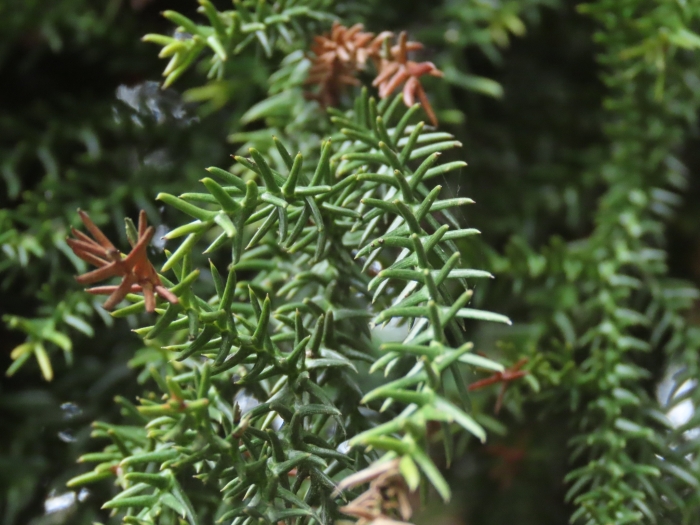Hoop Pine
(Araucaria cunninghamii)
Hoop Pine (Araucaria cunninghamii)
/
/

© chiuluan
CC BY 4.0
Image By:
© chiuluan
Recorded By:
Copyright:
CC BY 4.0
Copyright Notice:
Photo by: © chiuluan | License Type: CC BY 4.0 | License URL: http://creativecommons.org/licenses/by/4.0/ | Uploader: chiuluan | Publisher: iNaturalist |

























Estimated Native Range
Summary
Araucaria cunninghamii, commonly known as hoop pine, is an evergreen tree native to subtropical rainforests in Australia and New Guinea. It is a long-lived species, with individuals reaching up to 450 years of age. Hoop pine can grow to a towering height of 197 feet (60 meters), with a straight, cylindrical trunk and horizontal branches forming a symmetrical, conical crown. The bark is rough, brown, and tends to peel in thin, papery layers. The species produces large, woody cones that disintegrate upon maturity to release edible seeds, which are a traditional food source for Indigenous Australians.
Hoop pine is valued for its timber, which is used in a variety of applications including plywood, furniture, and interior fittings. It is also planted for ornamental purposes in parks and large gardens, where its impressive stature and symmetrical form can be showcased. In cultivation, hoop pine prefers well-drained, acidic to neutral soils and can tolerate a range of light conditions from full sun to part shade. It requires regular watering, particularly in drier climates. While the species is protected in conservation areas like Lamington National Park, it has faced depletion in its natural habitat due to logging. In plantations, hoop pine has been subject to damage by native rodents, which can impact young trees and seed production. The resin of the tree has historical uses by Aboriginal Australians, who utilized it as a type of cement.CC BY-SA 4.0
Hoop pine is valued for its timber, which is used in a variety of applications including plywood, furniture, and interior fittings. It is also planted for ornamental purposes in parks and large gardens, where its impressive stature and symmetrical form can be showcased. In cultivation, hoop pine prefers well-drained, acidic to neutral soils and can tolerate a range of light conditions from full sun to part shade. It requires regular watering, particularly in drier climates. While the species is protected in conservation areas like Lamington National Park, it has faced depletion in its natural habitat due to logging. In plantations, hoop pine has been subject to damage by native rodents, which can impact young trees and seed production. The resin of the tree has historical uses by Aboriginal Australians, who utilized it as a type of cement.CC BY-SA 4.0
Plant Description
- Plant Type: Tree
- Height: 60-130 feet
- Width: 10-20 feet
- Growth Rate: Slow
- Flower Color: N/A
- Flowering Season: Non-Flowering
- Leaf Retention: Evergreen
Growth Requirements
- Sun: Full Sun, Part Shade
- Water: Medium
- Drainage: Medium, Fast
Common Uses
Erosion Control, Low Maintenance
Natural Habitat
Subtropical rainforests in Australia and New Guinea
Other Names
Common Names: Hoop Pine, Moreton Bay Pine, Queensland Pine, Richmond River-Pine, Colonial-Pine, Coonam
Scientific Names: , Araucaria cunninghamii, Araucaria cunninghamii,
GBIF Accepted Name: